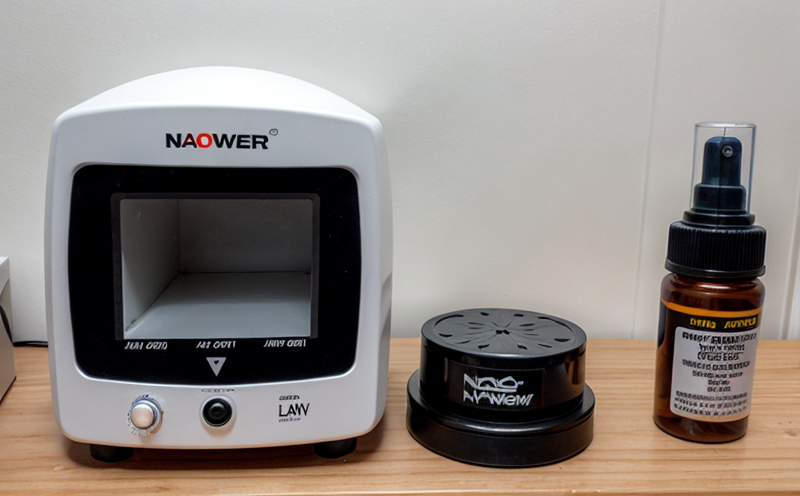ISO 18827 Colloidal Stability Evaluation of Nanoparticulates
The ISO 18827 standard provides a method to evaluate colloidal stability in suspensions of nanoparticles. This evaluation is essential for ensuring the long-term performance and safety of nanomaterials across various industries, including cosmetics, electronics, pharmaceuticals, and environmental science.
The test procedure involves the measurement of sedimentation velocity using laser diffraction particle sizing techniques over a defined period to determine the rate at which nanoparticles settle out of suspension. This helps in understanding how stable the colloidal system is and whether it will maintain its properties under real-world conditions. The standard specifies that samples should be tested for at least 24 hours, but longer periods can provide more comprehensive data.
Preparation of samples before testing is crucial. Nanoparticulates need to be dispersed uniformly in a suitable solvent or matrix. It's important to note the dispersant used as it can significantly affect colloidal stability. After dispersion, the sample should be allowed to settle naturally under controlled conditions to avoid any artificial destabilization during measurement.
The ISO 18827 test utilizes laser diffraction technology which provides precise particle size distribution data. This instrument measures scattered light intensity and calculates the volume-weighted mean diameter of particles present in a suspension. The stability index, derived from these measurements over time, indicates whether the nanoparticles remain dispersed or start to settle out.
This evaluation is not just limited to academic research but also has significant practical applications. In the pharmaceutical industry, for instance, ensuring colloidal stability can prevent potential drug delivery issues. In cosmetics, it ensures that products maintain their smooth texture and color consistency over time. For electronics manufacturers, it helps in optimizing processes for nanoparticle-based materials like quantum dots or carbon nanotubes.
The results from ISO 18827 testing are critical inputs for quality assurance teams to monitor the stability of nanoparticles throughout production cycles. Compliance with this standard ensures that products meet regulatory requirements and perform reliably under various conditions.
Understanding the colloidal behavior of nanoparticulates is vital, especially when considering their use in complex formulations where interactions between different components could lead to instability. By employing ISO 18827 testing early in product development phases, manufacturers can identify potential challenges and address them proactively before scaling up production.
In summary, the ISO 18827 colloidal stability evaluation offers a robust framework for assessing nanoparticulate suspensions' long-term behavior. This knowledge is indispensable for ensuring consistent quality and performance across all stages of product lifecycle management.
Industry Applications
The ISO 18827 standard finds application in numerous sectors where colloidal stability plays a crucial role:
- Pharmaceuticals: Ensuring drug delivery systems remain stable during storage and administration.
- Cosmetics: Maintaining product texture and color consistency over time.
- Environmental Science: Understanding the fate of nanoparticles in aquatic environments.
- Electronics: Optimizing processes for high-performance materials like quantum dots or carbon nanotubes.
Each sector leverages this evaluation to enhance product quality, ensure regulatory compliance, and improve overall performance. The insights gained from ISO 18827 testing are particularly valuable in R&D efforts aimed at developing new nanoparticulate-based products.
Why Choose This Test?
- Comprehensive Data: Provides detailed information on particle settling behavior over extended periods.
- Regulatory Compliance: Ensures adherence to international standards for nanoparticulate stability evaluation.
- Precision Measurement: Utilizes advanced laser diffraction technology for accurate particle size distribution data.
- Consistency Assurance: Helps maintain consistent quality across production cycles.
- Proactive Problem Solving: Identifies potential issues early in the product development phase, allowing for timely adjustments.
- Enhanced Reliability: Ensures reliable performance of nanoparticulate-based products under various conditions.
The ISO 18827 test offers a comprehensive approach to assessing colloidal stability, making it an essential tool in the development and quality assurance processes for nanomaterials across multiple industries.





